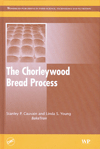With the international futures price of sugar nearly double what it was last year, the American Bakers Association is firing an “early warning” shot.
With the international futures price of sugar nearly double what it was last year, the American Bakers Association is firing an “early warning” shot.
That’s according to Robb MacKie, ABA’s president and CEO. MacKie acknowledges that the current tight supply for sugar may be alleviated by the end of the year should U.S. Department of Agriculture take action to increase U.S. imports. However, he adds, “if things continue, then we would be in a dire situation, and we did not want to wait until the 11-and-a-half hour to talk to the USDA.”
The tight supply, he says, is due to a drought in India, which historically has been a net exporter of sugar, but is now a net importer of the commodity. Additionally, the shortage in sugar has been exacerbated by greater Brazilian use of cane sugar for ethanol, much like what happened last year with the high price of corn being used for ethanol. Additionally, the U.S. sugar crop is shrinking as well, he says.
“We’re not down to 13 days of supply today, but when you look at all of the crop reports and all of the analysts’ estimates, we could definitely be back in the situation we were in post-[Hurricanes] Katrina and Rita,” MacKie explains. “There is some fear that can happen, and the marketplace is reflecting that fear.”
ABA, he says, wants to educate government officials as well as consumers on the prevalence of sugar in baked goods.
“Everyone looks at a cupcake, and they get it,” MacKie says. “They don’t realize it’s in breads and rolls, and frankly, a lot of it is in these whole grain products because they want to moderate the taste of whole grains.”
Additionally, many bakers are moving away from using high-fructose corn syrup, especially in natural or organic breads, because of criticism by some vocal consumer groups that the sweetener is linked to America’s problem with being overweight. That issue is currently up for debate.
Further aggravating the situation are U.S. restrictions on imports and price supports for sugar, which are around 18 cents a pound. Bakers, MacKie says, are beginning to pass on price increases to consumers, although he adds that they won’t be as dramatic as the price increases during last year’s wheat crisis because there are several alternatives to using sugar.
“Folks got caught on wheat and waited and hoped and then they had to come late to the table with prices increases last year,” MacKie says. “I don’t think they are waiting now.”
Get our new eMagazine delivered to your inbox every month.
Stay in the know on the latest snack and bakery industry trends.
SUBSCRIBE TODAY!Copyright ©2024. All Rights Reserved BNP Media.
Design, CMS, Hosting & Web Development :: ePublishing





